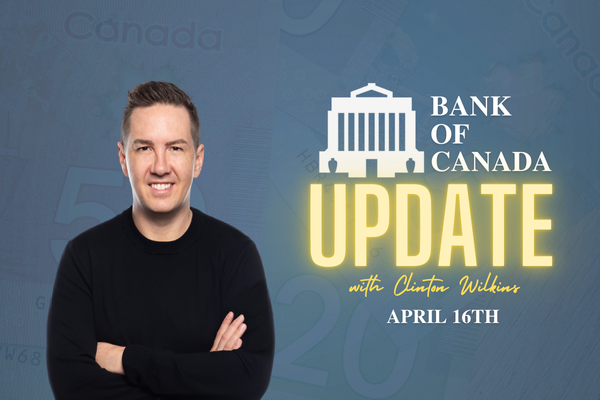On 95.7 News Radio, Clinton and Todd discussed the importance of credit monitoring due to rising fraud and data breaches.

Bank of Canada Update – First Pause After Seven Cuts – April 16th
Clinton Wilkins joins Todd Veinotte on 95.7 News Radio to discuss The Bank of Canada holding its key policy rate at 2.75%, marking the first pause after seven consecutive cuts.
Bank of Canada’s Rate Hold and Economic Uncertainty
Todd Veinotte
The Bank of Canada held its key policy rate at 2.75%, its first pause after seven consecutive cuts. Uncertainty around us, tariffs have made it impossible to issue regular economic forecasts, according to Tiff Macklem. Joining us to talk about all of this, of course, is our mortgage guru, Clinton Wilkins. Clinton, thanks for joining the show. So, thoughts in general. Surprise, what are your thoughts here?
Clinton Wilkins
Earlier this week, we were projecting that there was going to be a hold, but when the job numbers came out, I think most economists were 50/50 on whether it was going to be a cut or a hold. I think this hold is primarily driven by the shift in policy in the US, and the trade policy has impacted the Bank of Canada’s decision. I think the Bank of Canada has left the door open to more cuts. I will be very optimistic and say that we will see maybe another 50 basis points and cuts later this year. Again, we’re going to be watching what is going on with inflation and what is going on with the job numbers going forward.
Todd Veinotte
Okay, so obviously, if you’re carrying a line of credit, or if you’ve got a variable mortgage, or whatever it is, you always like to see a decline because that means you’ll pay less. But conversely, it’s not an increase which is good.
Clinton Wilkins
It is not an increase, and the door is open to further decreases. So I think that’s important to note, normally, the way that it works when the bank Canna starts cutting rates, and there were seven consecutive cuts up until now. So basically, a year ago, the rate cuts started. Typically, we go into an environment where the rates continue to cut. Then we go into a plateau, and then, typically, we would go into an increased period. Right now, Bank Canada is being very cautious. They want to make sure that inflation is not going to rise, especially with the whole tariff environment. I can’t even tell you, Todd, today, what is going on with tariffs. I think by and large, most people don’t know exactly what’s going on, because there’s been so much noise. There have been so many changes. So that’s something that is a big concern for the Bank of Canada, and we’re going to continue to monitor it. The one thing I do want to call out is that fixed rates have increased over the last few days and weeks, primarily because institutional investors, like banks, for example, are investing in buying 10-year bonds and the fixed rates are driven by what is going on in the bond market. Retail investors like you and I have gone to the stock market and bought stocks over the last few weeks, because everything has been on sale, but the institutional investors have gone to the bond market, and that is what has continued to drive these fixed rates up. So I think there’s a lot of uncertainty out there for consumers. And, I think a variable rate is still a great product, and I think we’ll continue to see those variable rates continue to go down over the next few months, and hopefully into the end of this year.
Todd Veinotte
You talk with the equity market and the bond market, and the bond market is kind of is one of the real indicators that when the bond market softens, that’s when some people, because that’s kind of a real consumer confidence benchmark indicator, right? So that’s very serious. When the bond market starts going south, that’s when economists are paying attention. Am I wrong or right on that?
Clinton Wilkins
I think it’s something that they’re keeping an eye on all the time, Todd, and that’s something that goes up and down, and typically in concert with what would happen in the stock market. But right now, we’re in one of these situations, and it’s just driven by what’s gone on in the US, that things are really separating in terms of, instead of moving together. Or how is this all? We may be in a situation where the Bank of Canada does more cuts here later this year, and we may see the fixed rates increase, and typically the, you know, variable rate in the and then Canada would be lower than what’s going on with the fixed rates. And right now, the rates are very similar to each other,
Todd Veinotte
So, how is this impacting the housing market, and in general, all this flux and insecurity about what’s happening here? How is this impacting the housing and mortgage world?
Clinton Wilkins
There was an article out this morning that said the optimism from realtors and the real estate market in Canada has been muted now with what is going on. Especially what’s going on in Ontario, the job losses and in Alberta. The interesting thing, Todd, we’re almost in this little micro chasm here in Atlantic Canada and Halifax, our economy is continuing along. And you know, we’re not just driven by things like manufacturing, which is going to be heavily, heavily impacted by trade policy in the US. So I’m very optimistic here in Nova Scotia and Halifax. I don’t think it’s the same optimism across the country. So I think the optimism that the real estate market was back and booming across the country, I think, is going to be muted by what’s going on in the US. But again, that can change tomorrow, and I almost feel like we’re on Survivor or one of these reality shows. We need to expect the unexpected.
Advice for Concerned Clients
Todd Veinotte
So what are what some advice that you give some of your customers, some of your clients who have a lot of concerns. I’m sure you’re getting tons of phone calls, and you guys do a great job maintaining connections with your clients anyway, with yearly reviews. Well, what are you telling people who are nervous right now about all this?
Clinton Wilkins
I can tell you, I think the anxiety and the mental health and the uncertainty from consumers is at an all-time high, Todd. I encourage everyone to seek the advice of someone whom they’re going to trust. Sometimes it’s not just the lowest rate that is the best rate. Having the advice is very, very important, and I think it’s looking at your options. For example, in our office, we’re reaching out to a ton of clients that we did mortgages for the last couple of years. If you remember Todd two years ago, a fixed rate was in the 6% range, so things have come down overall about 2% in the last two years. So we need to remember that the rates still are lower than they were, but everybody’s situation is different, and that’s why I think it’s really important to evaluate where you’re at and seek the advice of someone that you’re going to trust.
Todd Veinotte
All right, put on your pragmatistication hat, your prediction hat, and tell us what you think is going to happen over the next few weeks, next few months. With rates, what are your what’s your instinct?
Clinton Wilkins
My crystal ball is broken right now, but I think the rates are going to continue to soften. You know, that’s the overall sentiment, and I don’t want consumers to think, “Hey, we’re in a hold now.” We’re going to see fixed rates go up. We’re going to see variable rates go up. That’s not really what I’m saying here. I think this is a moment in time that we’re taking pause evaluating, and I think we’re going to continue to see rates go down, and the demand here in Halifax, in Atlantic Canada, I think, is very, very high. We had a lot of pent-up demand the last 18 months, 24 months, and I can tell you, there’s been a lot of activity in the market so far for 2025, and I think it’s going to be a busy year, right?
Todd Veinotte
We continue to hear from some people who suggest that we’ve got a housing bubble or a housing crisis on the horizon. But what are your thoughts on that?
Clinton Wilkins
I think we have a supply issue here. I think our population is going to continue to grow in Halifax, and we’re not getting enough units online. You know? I think there are certainly a lot of apartments that have come on. Recently, in the downtown core, Todd, I’m all about building on the corridors of Wise Road, Young Street, where the studio i,s a Robie Street. I’m all about building that up. But we need housing of all types, and we’re not building enough single-family rows and freehold properties for clients to buy. I think part of the reason is that we have a supply issue. And I said this before, but it’s a little old lady, and the little old man didn’t have an apartment to go into, so they didn’t sell their home for a first-time home buyer to get into the market. I think that’s going to start writing itself, especially when we see more of these apartments coming online.
Todd Veinotte
When it comes to, I guess, more timing the market, and trying to get the exact, precise time when the rate is what you would hope and that the housing market itself is exactly what you were looking for. That’s difficult to time all of that. What are your what’s your advice when it comes to those people who are waiting for the perfect moment to purchase?
Clinton Wilkins
If you’re waiting for the perfect moment, you’re gonna be waiting a long time. That’s what I tell folks, and that’s what I tell our clients: you’re just dating the rate. So I everyone needs to remember that a rate is typically anywhere from six months up to 10 years, the rate is going to change the purchase price that you pay for the real estate. That’s what you’re marrying. So you need to be okay with what you bought. You need to be happy with the security. And I think if you’re going to buy a property, you need to be committed that you’re going to being in this property for five to 10 years. We hope that real estate values are going to. Continue to increase, but if you’re going to buy a property, you need to be committed to that property. I’m less concerned about the rate. Yes, I’m in the rate business. I’m in the mortgage finance business, but the rates change, and we can always change the rate. It’s a lot easier to change your mortgage than it is for you to sell your home and buy another one.
Stress Test and Renewals
Todd Veinotte
And the stress test is still applicable?
Clinton Wilkins
Stress Test is still a thing, and we’re qualifying all new transactions on a stress test if it’s a renewal, and we’re moving you from lender to lender, as long as there’s no new money, no stress test. So it’s positive for people that are coming up for renewal, they don’t need to qualify with the stress test. We still would go through the normal application process when we’re looking at income, assets and credit, but they don’t have to qualify with the stress test, which is awesome. So in terms of moving lenders at renewal, it is creating, I think, more competition, which means the consumer is going to get the best possible, you know, financing for their needs.
Todd Veinotte
So obviously, with 2.75%, the stress test would put, put that at what? What would you need to qualify for to meet the stress test?
Clinton Wilkins
That’s a really good point. 2.75 is the key overnight rate. The actual prime rate for most lenders is 4.95, so the stress test is 2% above the contract rate. So, for example, let’s say we were giving a consumer a fixed rate at 3.99, Todd, we would qualify them at 5.99, right? So 2% above the contract rate.
Todd Veinotte
And the purpose of the stress test is, is just to ensure that the consumer can afford it if there are hikes and bumps to the rate that are physical.
Final Thoughts and Future Outlook
Clinton Wilkins
And thank goodness we did think about the mortgages that we did five years ago at 2%, right? We qualified those folks at five and a quarter, or whatever the rate was at that time. And a lot of those consumers that came up over the last year and two years were renewing into mortgages that were in, 5% plus they qualified when we did the mortgage at that higher rate, so we had very low losses here in Canada, and Canadians, by and large, make their mortgage payments on time.
Todd Veinotte
Indeed. Clinton, always great. Appreciate it very much, and we’ll talk again soon, my friend.
Clinton Wilkins,
Thanks for having me, Todd.


